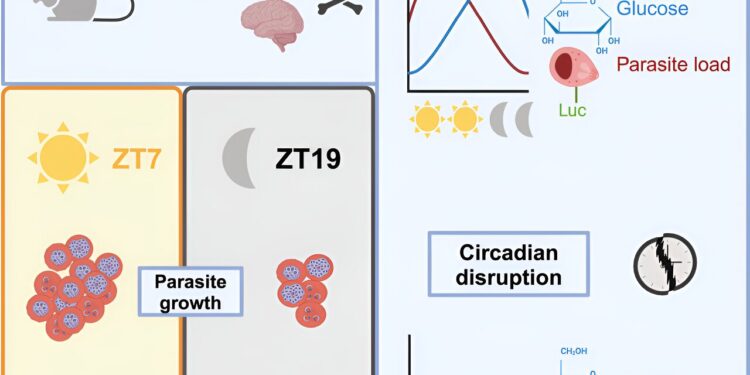Graphic summary. Credit: iScience (2024). DOI: 10.1016/j.isci.2024.109684
A discovery by McGill-affiliated researchers could lead to more effective treatment for malaria and other parasitic diseases.
When mice are infected at night with the parasites that cause cerebral malaria, symptoms of the disease are less severe than in those infected during the day, and the spread of the parasites within the hosts is more limited, research teams from McGill University, the Douglas Research Centre and the Research Institute of the McGill University Health Centre have found.
Malaria is a mosquito-borne infectious disease that affects hundreds of millions of people worldwide. It kills more than half a million people each year, most of them children. Cerebral malaria is the most deadly form of the disease.
The researchers’ findings could lead to new therapeutic practices based on aligning medications with our circadian rhythms. The article is published in the journal iScience.
How host and parasite circadian rhythms interact
Circadian rhythms are defined as physiological and behavioral oscillations whose cycles of approximately 24 hours correspond to the rotation of the Earth and that persist in the absence of environmental time signals. These rhythms are regulated by a central clock in the brain, as well as by clocks located in most other organs and cell types in the body.
“We studied how the circadian rhythms of the host and the malaria parasite interact to affect disease severity and the host’s ability to fight the parasite,” said Priscilla Carvalho Cabral, a recent McGill doctoral graduate who led the experiments described in two recent studies on the topic.
Nicolas Cermakian, director of the Molecular Chronobiology Laboratory and corresponding author of both studies, noted: “The difference in a host’s response to infection depending on the time of day suggests that their circadian rhythms could influence disease progression. The impact of these immune clocks on malaria has never been studied before.”
A major advance in knowledge
In parasites and their animal hosts, as in most living organisms, many bodily functions are under circadian control. For example, it is known that the replication of malaria parasites in the red blood cells of a host follows a daily rhythm.
Previous work by the same team has already shown that another serious parasitic disease, leishmaniasis, is affected by host clocks: the timing of infection influences parasite replication as well as the immune response to it. In the new studies, the same observation was found to be true for cerebral malaria.
“Our results represent an important advance in knowledge since several of the mechanisms that govern the rhythms of susceptibility to diseases, particularly parasitic diseases, remain largely unknown,” says Martin Olivier, director of the Laboratory for the Study of Host-Parasite Interactions, professor in the Department of Microbiology and Immunology at McGill and co-author of both studies.
More information:
Priscilla Carvalho Cabral et al, Time of day and circadian disruption influence host response and parasite growth in a mouse model of cerebral malaria, iScience (2024). DOI: 10.1016/j.isci.2024.109684
Provided by McGill University
Quote:Circadian rhythms appear to influence vulnerability to malaria parasites (2024, August 19) retrieved August 19, 2024 from
This document is subject to copyright. Apart from any fair dealing for the purpose of private study or research, no part may be reproduced without written permission. The content is provided for informational purposes only.



